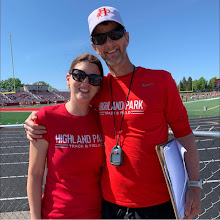To expand a little on my Daws comment to Miler yesterday. Daws says not to focus on pace, but rather effort for these runs. The effort should be close to your marathon effort, which is rather fast. But you also have to take into account things like being bundled up, wearing heavier shoes, weather conditions, footing, etc. While I didn’t really have a goal pace in mind, I thought sub-7s would be great and anything over 7:30s would be a bummer.
After a mile with the dog and another 2 mile warm-up, I started to pick up the pace. This was one of those workouts where I started pretty conservative because “8 miles is a long way” kept ringing through my head. But before I knew it I was at the turnaround point and feeling good. I picked up the pace some more and focused on relaxing, a quick turnover and staying positive – all those affirmations that will come in handy on June 17th.
When it was all said and done I looked at the results and saw 29:15 (7:19 pace) for the first 4 miles and 27:52 (6:58 pace) for the return trip. For my first real solo attempt (outside) at a marathon pace-type workout, I’ll take it. Throw in a 2 mile cool-down and I had a nice 13 mile morning run.
Today’s quote of the day is for Rob, after reading his post yesterday.
“I think people can handle 150 to 200 miles a week. But something has to give somewhere. If he’s a student, how’s he going to study? He may be at the age of chasing and courtship, and that’s an important form of sport and recreation, too.” Bill Bowerman

4 comments:
Thanks for the quote. Sometimes I think running the 150-200 miles a week would be easier than going to school. Now if I can convince my wife that I can somehow make money off of running that much.
I suppose in one sense, saying "Lydiard said so" could end all discussion -- of course you'll do just fine if you follow Lydiard's training principles faithfully. I think if you've got to choose between 100mpw slow and 50mpw fast, do the 100. But if you can do 100mpw at a sub 7 pace, my hat's off to you. I've no doubt that if you can do that without breaking down, you'll be fast.
However, I do find it interesting from a purely theoretical standpoint to examine them anyway. For example, Lydiard advocated eating honey, but it's doubtful that this is necessary to run well.
So regarding my questions about aerobic running -- I think they're still unanswered, because as far as I can tell, there's no compelling reason to believe that it's more effective. My purely theoretical argument against it, is that once you max out a system, you don't add to the effect by placing further load on other systems. For example, sprinting doesn't gain you aerobic benefits over about 3k pace, because the extra output is purely due to anaerobic metabolism.
But ultimately it's an empirical question, and like you, I'm a numbers guy who won't settle for a theoretical argument (not even my own).
Yeah, it's easy to say Lydiard said so and leave it at that. His results are hard to argue. Intuitively, it makes sense that someone hoping to run 6:30 pace for 26 miles can't do all his running at 8:30 pace. 2 minutes a mile is a huge difference and 26 miles is a long way.
While Lydiard said run a strong aerobic effort "as much as possible," Daws backs off of that statement. He realized that a strong aerobic pace is near marathon pace and that's a fairly fast pace to be running every (or nearly every) day. So Daws advocates the hard/easy approach as well as throwing in fartlek workouts to mix things up.
I should also say that Daws thought these strong aerobic runs were more important towards the end of the base-building phase as it helps with the smooth transition into hills and anaerobic training.
With that said, there's no way I'd get to 100 mpw at sub-7 pace, but maybe 100 mpw with say 30 miles at sub-7 pace.
Right now I'm trying to stick with Lydiard and Daws on training advice. While honey probably helps with energy, I'm not going to eat a "gallon" a day because Lydiard said so. He also said the best shoe would be to just glue the sole from your shoes to your feet. I'm not about to try that either.
As they say, we're all an experiment of one. I'm willing to experiment with mileage and pace and see what happens. Maybe I'll go back to slower runs in order to keep my mileage up or cut my mileage and keep the quicker stuff. Right now I'm feeling good about where I'm at.
I seem to remember Daws saying that you could only realistically expect to run your "best aerobic effort" for 30% or so of your miles if you're fit. I think there are different benefits and purposes for faster and slower aerobic efforts. I think the faster ones (or tempo runs) are more for building "lactate buffering", or more simply, running at or just below your lactate threshold gets your body more used to it, which makes it process lactate more efficiently, which eventually raises your lactate threshold, or the top speed at which you can run without accumulating more lactate than you can clear. I take the slower aerobic efforts as building mitochondria and extending and growing capillary beds.
Post a Comment